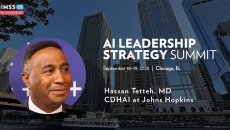Artificial Intelligence
Smaller scale workflows and ambient technologies are big everyday wins and the next move is toward clinical summarization, says Rachini Moosavi, chief analytics officer for UNC Health.
Bo Watson, a Tennessee state senator and physical therapist, says that, while AI tools can guide clinical decisions and increase operational efficiency, the ultimate responsibility for care rests with clinicians.
The collaboration gives tech startups the ability to to demonstrate value directly with clinicians.
The integration of One Medical to technology-driven pharmacy fulfillment strategically bypasses high overhead such as staffing.
Julie Frey, VP of product at Wolters Kluwer Health, explains how its recently released UpToDate Expert AI brings generative AI to clinicians at the point of care, offering diagnostic and treatment guidance.
The partnership is meant to ease pressure on radiologists by improving their workflows.
The book by Dr. Hassan Tetteh tells of his start in medicine to becoming chief medical informatics officer with the Navy to spending the last five years implementing AI through the Joint Artificial Intelligence Center at the DoD.
The University of Toledo's Dr. R. Ryan Sadeghian says hospitals may not always need a chief AI officer; having a trusted leader who understands data science, is respected by physicians and has the board's confidence is more important.
More than 700 rural hospitals across the United States are at risk of closure due to financial hardship.
The AI-native model yields revenue cycle results that were unimaginable only a year ago, says athenahealth.









